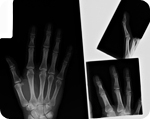
Bones need vitamin D combined with calcium for best results
Thursday, January 17, 2008 by: David Gutierrez, staff writer
Tags: vitamin D, health news, Natural News
- Decades of ignored warnings: How U.S. regulators failed to act on wireless radiation linked to 23 chronic diseases
- Democrats cry as “liberal supply chains” are wiped out and their favorite multi-billion dollar money machine is shut down
- China used as SCAPEGOAT for TikTok ban: ISRAEL was the driving force behind the ban, wanted to quash pro-Palestinian content
- B’nai Brith Canada introduces “Seven-Point Plan to Combat Antisemitism” that proposes suspension, firing or PRISON TIME for violators
- Studies strongly suggest taurine supplementation can promote longevity
- DIRTY VACCINES: Dr. Anthony "Fraudulent" Fauci, King of the Covid scamdemic, admits "We don't do placebo trials on vaccines"
- Trump’s reported FBI finalists mark key battle between deep state and loyalist
- UK under leftism becoming wasteland of political prisoners who violated police state’s anti-speech laws
- EPA advisor admits the agency is funneling billions to climate groups ahead of Trump’s return to White House
- Mold often OVERLOOKED as cause of sicknesses, anxiety and depression
- Britain denies reports that Russia’s “most dangerous” warship held military drills in the English Channel
- Stan Johnson on the Health Ranger Report: Henry Gruver’s 2016 vision of second Trump term becomes reality in 2024
- U.S. to sell $300 million upgrade program for South Korean navy’s destroyers
- This DNC clip shows why Democrats will keep losing...
- Two containers with completed ballots fall out of truck in Florida
- Beef, milk supply TAINTED with new BlackRock-backed animal drug called Bovaer that claims to stop animal farts
- Mike Adams and Dane Wigington expose the truth: Are homes being intentionally ignited in California?
- DISNEY executive charged with felony child sex abuse … The empire of Disney has always had a child exploitation secret
- Studies strongly suggest taurine supplementation can promote longevity
- Democrats cry as “liberal supply chains” are wiped out and their favorite multi-billion dollar money machine is shut down
- Two containers with completed ballots fall out of truck in Florida
- Stan Johnson on the Health Ranger Report: Henry Gruver’s 2016 vision of second Trump term becomes reality in 2024
- U.S. to sell $300 million upgrade program for South Korean navy’s destroyers
- RFK Jr. clears key hurdle: Sen. Susan Collins backs controversial HHS nominee, signaling a new era for health policy
- UK’s Online Safety Act comes into effect: The dangerous, slippery slope of censorship laws
- EPA advisor admits the agency is funneling billions to climate groups ahead of Trump’s return to White House
- Ukraine’s brutal assassination of Russian General Kirillov reveals the depths of coverup for biological weapons and bio labs in Ukraine
- PBS shutters DEI office in wake of Trump’s executive order
- This DNC clip shows why Democrats will keep losing...
- “Cancer Gag Act” threatens farmers’ rights and public health: A dangerous push for corporate immunity
- Top 10 foods that BOOST DOPAMINE and help you stay focused, fit, positive and motivated
- Mike Adams and Dane Wigington expose the truth: Are homes being intentionally ignited in California?
- Mach 7 drone illustrates China's latest leap in hypersonic technology
- DISNEY executive charged with felony child sex abuse … The empire of Disney has always had a child exploitation secret
- Britain denies reports that Russia’s “most dangerous” warship held military drills in the English Channel
- Trump’s reported FBI finalists mark key battle between deep state and loyalist
- EPA advisor admits the agency is funneling billions to climate groups ahead of Trump’s return to White House
- Global leaders unite to clamp down on “misinformation” with UN-backed Cascais Declaration
- HYSSOP: What research reveals about the health benefits of this ancient holy herb
- I Want My Bailout Money – new song released by Mike Adams
- Global tensions, natural disasters and the looming shadow of world war - all predicted by Mike Adams and Steve Quayle three years ago
- The new American dream: $500,000 nuclear bunkers and the fear of WWIII
- Trump is taking on the media, exposing defamation and WINNING BIG
- Big Banks shift the burden of losses to taxpayers through the Federal Reserve in the form of BAILOUTS
- Is America's "giant debt factory" Federal Reserve setting us up for an economic nightmare?
- Top 10 foods that BOOST DOPAMINE and help you stay focused, fit, positive and motivated
- State Farm cancels thousands of home insurance policies in the Pacific Palisades region months before deadly fires
- Biden announces additional $500M military aid for Ukraine as California wildfires displace 70,000 residents
- Chemotherapy found to increase the number of tumor cells circulating in the blood, spreading it to previously unaffected areas
- Experts warn: Centralized digital currencies could be used to control how people behave
- Russia signals willingness to negotiate peace deal with Ukraine at neutral site in SLOVAKIA, but Ukraine rejects it
- Stan Johnson on the Health Ranger Report: Henry Gruver’s 2016 vision of second Trump term becomes reality in 2024
- Mike Adams Sermon 42: God’s superfruit FIGS can fight warts, staph infections and cancer
- New BRICS banking system will render Western sanctions on Russia USELESS
- Red Cross issues warning to stop blood plasma donations from vaccinated people
- Scientists confirm: GENIUS brain function can be spontaneously unleashed in humans without any apparent cause
- DATA: England’s vaccinated population had close to one million deaths in 23 months; unvaccinated population had less than 61,000 deaths over the same period
- HYSSOP: What research reveals about the health benefits of this ancient holy herb
- Arizona residents drive entire Maricopa County Board of Supervisors out of meeting after serving them for TREASON
- Fully vaccinated about to see “tsunami” of illness and death, warns virologist
- Today I asked our AI language model “Neo” about which phytonutrients or phytochemicals can block the spike protein related to SARS-CoV-2 … Here is what it answered…
- Two containers with completed ballots fall out of truck in Florida
- BREAKING: 2025 NDAA authorizes mandatory military draft of WOMEN across America… as Pentagon pursues global NUCLEAR war with both Russia and China at the same time
- We are building the infrastructure of human freedom… Brighteon.AI is the next launch that will put life-altering LLM technology into your hands for free
- Michael Yon warns of a ZIONIST TAKEOVER in Trump’s second administration
- ENGINEERED FAMINE: Oregon starts SHUTTING DOWN small farms “to protect the people”
- NASA admits that climate change occurs because of changes in Earth’s solar orbit, and NOT because of SUVs and fossil fuels
- Ozempic and Wegovy weight loss drugs are injectable LIZARD VENOM PEPTIDES that may unleash a devastating wave of organ failure… side effects align with symptoms of SNAKE BITES
- These 13 countries just signed an agreement to engineer a global FAMINE by destroying food supply
- Careless Whisper: AI-powered transcription tool being used by hospitals found to invent chunks of text no one ever said
- BBC staffers accuse media outlet’s executives of instituting bias in Gaza coverage, claiming favorable treatment of Israel
- Casual restaurant chain TGI Fridays files for BANKRUPTCY
It has long been known that vitamin D improves calcium absorption in the body, while calcium plays a critical role in the development and repair of bones. A previous meta- analysis of several prior studies, published in the Journal of the American Medical Association in 2005, concluded that an increased vitamin D intake of 700 to 800 IU per day reduced the elderly's risk of hip fracture by 25 percent.
The current study, also a meta-analysis, examined studies on postmenopausal women and men over the age of 50 in which the participants had been given oral vitamin D supplements, either with or without calcium supplementation.
The researchers found that no significant reduction in the risk of hip fracture could be observed in populations supplemented with vitamin D alone. However, in groups that received both vitamin D and calcium supplementation, the risk of hip fracture went down by 18 percent. When the researchers also included the studies that had been examined in 2005, they found that the risk of hip fracture was 25 percent lower in those who received both calcium and vitamin D supplements, compared with those who received only vitamin D supplementation.
For greatest effectiveness, the researchers recommended a daily supplement of 700 to 800 IU of vitamin D and 1,000 to 1,200 milligrams of calcium. But they cautioned that this is not actually necessary for everybody.
"Universal supplementation in the elderly is unnecessary," they wrote. "Further research should identify those individuals who benefit most from vitamin D and calcium supplementation."
Consumer health advocate Mike Adams strongly disagrees with this statement. "Virtually all elderly people are chronically deficient in vitamin D," Adams said. "We not only need universal vitamin D supplementation in the U.S., Canada and the U.K., but we also need to greatly increase the recommended daily intake of vitamin D to 4000 IU instead of the typical 800 IU currently recommended by doctors."
Calcium is the best-selling supplement in the United States, with nearly one billion dollars in sales in 2004 alone, according to the Nutrition Business Journal.
Vitamin D at FETCH.news
Get independent news alerts on natural cures, food lab tests, cannabis medicine, science, robotics, drones, privacy and more.
Take Action: Support Natural News by linking to this article from your website
Permalink to this article:
Embed article link: (copy HTML code below):
Reprinting this article:
Non-commercial use OK, cite NaturalNews.com with clickable link.
Follow Natural News on Facebook, Twitter, Google Plus, and Pinterest
Science News & Studies
Medicine News and Information
Food News & Studies
Health News & Studies
Herbs News & Information
Pollution News & Studies
Cancer News & Studies
Climate News & Studies
Survival News & Information
Gear News & Information
News covering technology, stocks, hackers, and more



"Big Tech and mainstream media are constantly trying to silence the independent voices that dare to bring you the truth about toxic food ingredients, dangerous medications and the failed, fraudulent science of the profit-driven medical establishment.
Email is one of the best ways to make sure you stay informed, without the censorship of the tech giants (Google, Apple, Facebook, Twitter, YouTube, etc.). Stay informed and you'll even likely learn information that may help save your own life."
–The Health Ranger, Mike Adams













































